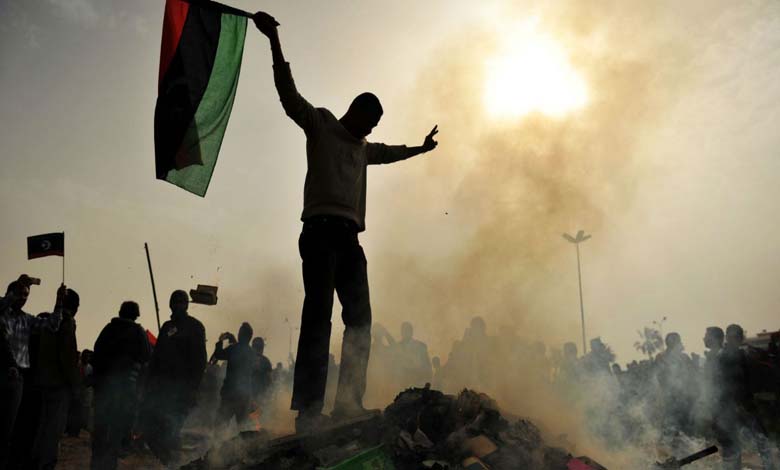Clashes, Divisions, and Delayed Solutions… Libya on the Brink of Explosion

Libya has returned to the forefront of regional and international attention after a week filled with political and security tensions, as violence escalates in western cities—an alarming sign of the country’s fragile political state and deep-rooted divisions among rival factions.
-
Libya’s crisis worsening – The obsession of power, conflicts of interest, and divisions
-
Political Stalemate Brings Militias in Western Libya Back into the Spotlight
Renewed bloody clashes between warring militias have further entrenched the divisions that have suffocated the country for years and complicated prospects for a way out of the crisis. Meanwhile, popular rejection of the ongoing chaos continues to grow, along with international concern over the risk of a full-scale explosion that could obliterate any remaining chance of resolution.
In this dire context, Libyan analysts agree that the key to resolving the entrenched crisis lies in dismantling armed militias, collecting weapons outside state control, and unifying the military institution to ensure a basic level of security stability.
These analysts stressed that any solution that does not go through the ballot box and does not give the Libyan people the opportunity to freely express their will would merely recycle the crisis under different labels, prolonging division and keeping the country hostage to internal conflicts and regional power struggles.
-
Libya Thwarts a Major Terrorist Plot near the Tunisian Border
-
Corruption and Terrorism Financing Drive Washington to Suspend Aid to Libya
Clashes and Mobilizations
The cities of Al-Khums and Zawiya witnessed fresh rounds of violence between armed groups. Intense fighting erupted between the “Misrata Joint Force” and the “Stability Support Apparatus,” resulting in civilian casualties and the destruction of both public and private property—an all-too-familiar scene reminiscent of the chaotic years following the 2011 regime collapse.
Military movements were not confined to city outskirts, with large-scale mobilizations observed around the capital, Tripoli, sparking widespread fears of a looming full-scale confrontation between rival factions.
In this context, the “Greater Tripoli Youth Movement” declared its firm rejection of any military escalation in the capital, warning of a field response if violence is forced upon them—an expression of growing public anger and fears of Tripoli once again turning into an open battlefield.
-
A Scheme That Made Them Outcasts: The Waning Influence of the Muslim Brotherhood in Libyan Municipal Elections
-
Libya Caught in the Crossfire of Great Power Rivalries… What Are the Possible Scenarios?
Legitimacy Conflict
Politically, a deep divide continues to dominate the Libyan scene. While the Presidential Council announced a set of legal measures aimed at paving the way for stability and elections, some political factions outright rejected these steps, calling them illegitimate or incomplete.
Meanwhile, the House of Representatives put forward a plan to form a new government tasked with preparing for the electoral process, deepening the rift and reigniting the debate over legitimacy and the distribution of executive power.
These tensions coincide with the United Nations Support Mission in Libya (UNSMIL) announcing it had received the final report from the advisory committee, containing proposals to resolve legal and political challenges related to the constitutional framework. The mission reaffirmed its intent to launch inclusive consultations to outline a clear roadmap toward unified elections and the consolidation of divided sovereign institutions.
-
Turkey extends its mission in Tripoli, and Libyan parties express their rejection
-
Escalating tensions… Airstrikes widen in western Libya
“No Stability Without Militia Disarmament and Elections”
Many Libyan experts believe the root of the crisis lies in the continuing chaos of unchecked weapons and militia dominance, amid the weakness of the state and its institutions, with internal and external actors exploiting this fragility for their own interests.
In this regard, political science professor Dr. Youssef Al-Farsi said that “the key to the solution lies in unifying the military institution and moving toward fair presidential and parliamentary elections.”
-
Is the change in the Libyan political scene capable of lifting Turkish supervision, or will they increase their consolidation ?
-
Armed Clashes in Tripoli Reveal Fragility of Security Situation
He emphasized that “any initiative that does not grant decision-making power to the Libyan people through the ballot box is merely a rebranding of the crisis.”
For his part, military analyst Mohamed Al-Tarhouni said that dismantling militias and collecting weapons beyond state control is the first and essential step toward achieving stability.
He confirmed “the continued presence of these armed groups only prolongs the crisis, weakens state institutions, and stalls genuine political transition.”
-
Lockerbie bombing: Dbeibeh admits Abu Ujaila’s extradition to Washington
-
Weapon Chaos in Libya: Zawiya under the Grip of the Al-Farr and Al-Qasab Conflict
Popular Outrage
Amid repeated political promises with no tangible results, signs of public anger are becoming more visible.
The “Libya al-Watan” movement has called for protests in several Libyan cities to reject what it described as “suspicious foreign projects,” particularly following reports of alleged plans to receive irregular migrants from the United States for resettlement in Libya.
This information, which sparked widespread outrage, was seen as an attempt to exploit the country’s turbulent situation and turn it into an arena for international trade score-settling—at the expense of national sovereignty and the suffering of the Libyan people.
-
Western Libya Ablaze: Bloody Clashes Turn Streets into Warzones
-
Libya’s Muslim Brotherhood Incites Armed Resistance Against Peaceful Solutions












